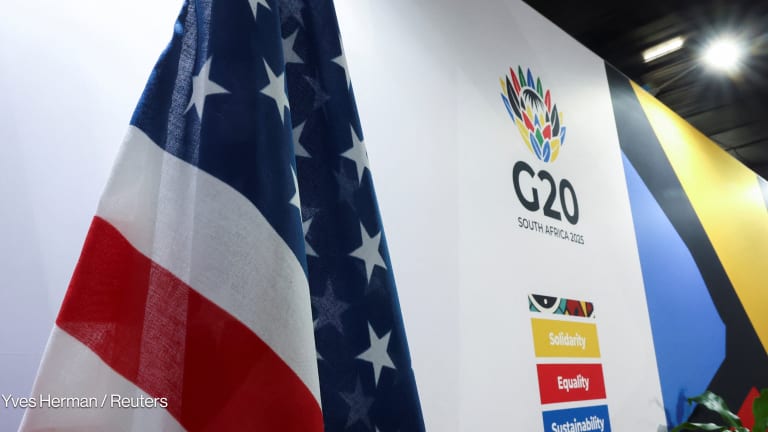
It has been less than a year since complex political wrangling over Italy’s finances resulted in the formation of a new Italian government, led by Enrico Letta. But with confidence in Letta’s premiership waning he resigned earlier this month, sparking a vote among members of the ruling centre-left Democratic Party that saw Matteo Renzi elected leader.
Renzi’s first act as prime minister was to nominate a Cabinet, whose composition marks a first in the country’s history: Women make up half of it, including the one at the helm of the ministry in charge of Italian development cooperation.
Who is Federica Mogherini and how will she impact Italian aid policy?
The 40-year-old Mogherini isn’t the first woman to take charge of the foreign ministry. Her immediate predecessor was. Emma Bonino’s tenure, short as it was, nonetheless saw a major milestone on efforts to reform Italian development cooperation.
On Jan. 24, following a long and in-depth debate, the Italian Council of Ministers approved the bill revamping Law 49 of 1987. Introduced by Lapo Pistelli, the vice minister in charge of international cooperation, the reform is designed to bring Italy’s foreign aid practice in line with that employed by other European donors, through the creation of a dedicated agency.
Mogherini was among those who firmly defended and supported the bill, as coordinator of the interparliamentary group for development cooperation that brings together members of more than 70 legislative groups and political parties.
“We can’t lose this chance [to have it approved], we have been working on it [for] 20 years, now we managed to have a draft, and by all means we can’t waste this chance, because there won’t be another one,” she said during a meeting on the reform in January.
A staunch supporter of international cooperation
The new Italian foreign minister’s stance is not surprising. She has been active in the field of international cooperation since the 1990s, being engaged in national and European campaigns against racism and xenophobia, regularly attending gatherings on cooperation and having strong links with Italian NGOs. She previously represented Italy at the NATO Parliamentary Assembly.
Speaking with Devex, Gianfranco Cattai, president of the Association of Italian NGOs, acknowledged that given Mogherini’s cooperation-friendly background, “expectations are high” that she will make an impact.
Draft cooperation law: What may be in store
Mogherini was known to promote discussions around reforming Italian development cooperation.
The bill, which still needs the signoff of both houses of parliament, foresees the creation of an operational structure to be known as Italian Development Cooperation Agency, that according to Pistelli will be “agile and swift, making our spending in the field even more fruitful.” Italy’s official development assistance is far behind the target of bringing it to 0.7 percent of the gross national income, only reaching 0.13 percent in 2012 with €2.053 billion. The previous administration has set a goal of 0.3 percent of GNI by 2017.
The legislation would institutionalize the role of the vice minister for international cooperation, now held by Pistelli. Pistelli awaits reappointment, and Italian aid groups want to see that happen because of the official’s deep engagement in the reform process.
The reform does not come without some concerns, including a contentious proposal allowing business enterprises to access concessional loans for investments in developing countries. Article 26 of the new law actively promotes the participation of for-profit activities in development cooperation and guarantees dedicated funds for loans and other mechanisms to encourage investments.
ActionAid’s Deputy Director in Italy Luca De Fraia urged caution: “If the business sector wants to join the cooperation world, it should stick to Busan’s principles,” he told Devex, referring to the global accord on development effectiveness forged in 2011.
Hopes for Italian cooperation
While the foreign ministry has welcomed a new chief, disappointing news has greeted the Ministry for Integration. That cross-cutting government body, which was responsible for ensuring that issues such as immigration and foreign policy went hand in hand and which was expected to play a continued role in the country’s international development policy, has now been abolished.
The aid community has turned its attention to what role Minister of Labor and Social Policy Giuliano Poletti may play. Poletti used to head the Alliance of Italian Cooperatives and has close ties with the voluntary sector, and Cattai said NGOs are expecting him to “pay special attention to aid cooperation.”
Aid groups will also be watching to see how the new government will assert itself on the European stage, particularly its leadership during the six-month rotating EU presidency from July.
“We expect the government to take dynamic and active action and take advantage of this opportunity to put the cooperation issues on the table,” CONCORD Italy spokesperson Francesco Petrelli told Devex, noting that cooperation is strictly linked to other external policy problems and the economic crisis.
Join the Devex community and access more in-depth analysis, breaking news and business advice — and a host of other services — on international development, humanitarian aid and global health.
Search for articles
Most Read
- 1
- 2
- 3
- 4
- 5








